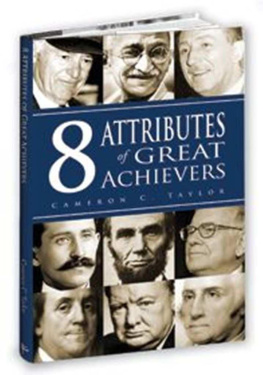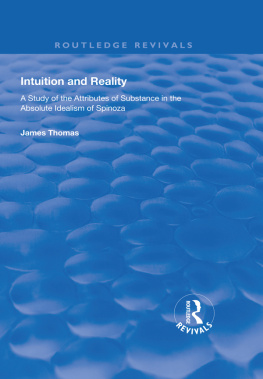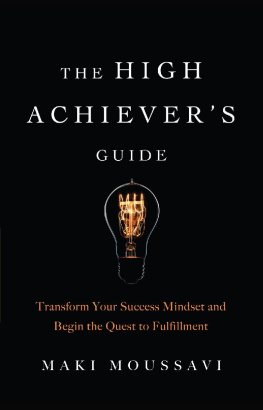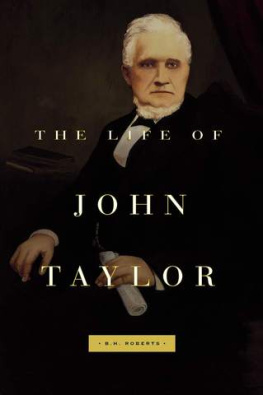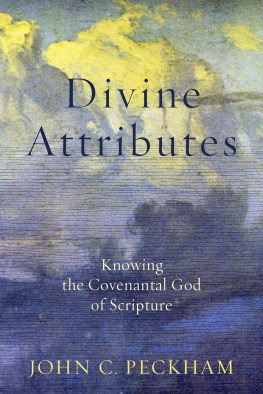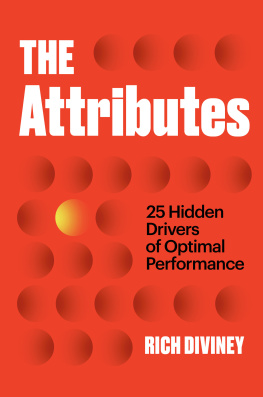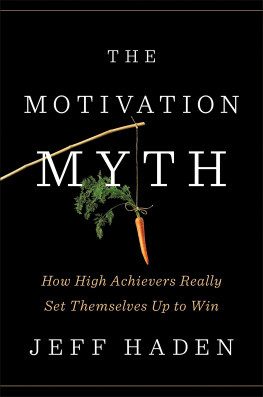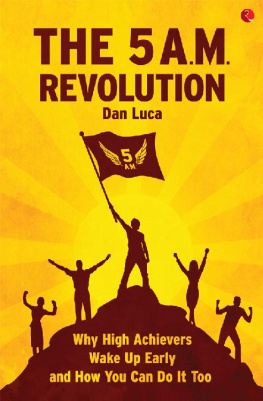Taylor - 8 Attributes of Great Achievers
Here you can read online Taylor - 8 Attributes of Great Achievers full text of the book (entire story) in english for free. Download pdf and epub, get meaning, cover and reviews about this ebook. year: 2010, genre: Romance novel. Description of the work, (preface) as well as reviews are available. Best literature library LitArk.com created for fans of good reading and offers a wide selection of genres:
Romance novel
Science fiction
Adventure
Detective
Science
History
Home and family
Prose
Art
Politics
Computer
Non-fiction
Religion
Business
Children
Humor
Choose a favorite category and find really read worthwhile books. Enjoy immersion in the world of imagination, feel the emotions of the characters or learn something new for yourself, make an fascinating discovery.
- Book:8 Attributes of Great Achievers
- Author:
- Genre:
- Year:2010
- Rating:4 / 5
- Favourites:Add to favourites
- Your mark:
- 80
- 1
- 2
- 3
- 4
- 5
8 Attributes of Great Achievers: summary, description and annotation
We offer to read an annotation, description, summary or preface (depends on what the author of the book "8 Attributes of Great Achievers" wrote himself). If you haven't found the necessary information about the book — write in the comments, we will try to find it.
8 Attributes of Great Achievers — read online for free the complete book (whole text) full work
Below is the text of the book, divided by pages. System saving the place of the last page read, allows you to conveniently read the book "8 Attributes of Great Achievers" online for free, without having to search again every time where you left off. Put a bookmark, and you can go to the page where you finished reading at any time.
Font size:
Interval:
Bookmark:
8 Attributes of Great Achievers
Cameron C. Taylor
Other Books by Cameron C. Taylor
Does Your Bag Have Holes? 24 Truths That Lead to Financial and Spiritual Freedom
Twelve Paradoxes of the Gospel
Available at bookstores and on authors website
www.DoesYourBagHaveHoles.org
Copyright 2009 Cameron C. Taylor. All rights reserved. No part of this book may be reproduced in any form without prior written permission.
This book is a work of:
Does Your Bag Have Holes? Foundation.
Phone: 1-877-No-Holes (664-6537)
CustomerService@DoesYourBagHaveHoles.org
http://www.DoesYourBagHaveHoles.org
Printed in the United States of America
Table of Contents
Introduction
Attribute 1: Responsible
Chapter I: Choice and Consequence
Chapter II: The Power to Choose
Attribute 2: Creator
Chapter III: The Story of the Farmer and the Thief
Attribute 3: Independent
Chapter IV: Avoid Harmful Help
Chapter V: Take the Initiative
Attribute 4: Humble
Chapter VI: Continually Seek Improvement
Chapter VII: Be Teachable
Chapter VIII: Be Humble
Attribute 5: Honest
Chapter IX: Integrity Pays
Attribute 6: Optimistic
Chapter X: Solutions or Excuses
Chapter XI: Uplift Others
Attribute 7: Vision
Chapter XII: Write Down Your Goals
Chapter XIII: Visualization and the Worlds Fastest Man
Attribute 8: Persistent
Chapter XIV: Success Is a Process
Chapter XV: The Power of Persistence
Conclusion
Introduction
As I have studied the lives of hundreds of great achievers, I have found that they each have possessed or currently possess certain attributes that were foundational to their achievements. Sometimes we see those who have achieved great success and think they are somehow uniquely gifted or talented and that we could never duplicate their success; however, great achievers are not simply born, they are developed. Each great achiever has worked to develop attributes throughout their life. For example, as a young man, Washington copied out in his own handwriting the code of a moral life and strived to live by it.
Benjamin Franklin recorded in his autobiography the desire to possess thirteen virtues. He then described the process of reviewing and working to develop each of these virtues, writing, My intention being to acquire the habitude of all these virtues, I judged it would be well not to distract my attention by attempting the whole at once, but to fix one of them at a time... I made a little book, in which I allotted a page for each of the virtues. I ruled each page with red ink, so as to have seven columns, one for each day of the week, marking each column with a letter for the day. I crossed these columns with thirteen red lines, marking the beginning of each line with the first letter of one of the virtues, on which line, and in its proper column, I might mark, by a little black spot, every fault I found upon examination to have been committed respecting that virtue upon that day. I determined to give a weeks strict attention to each of the virtues successively. Thus, in the first week, my great guard was to avoid the least offence against Temperance, leaving the other virtues to their ordinary chance, only marking every evening the faults of the day. Thus, if in the first week I could keep my first line, marked T, clear of spots, I supposed the habit of that virtue so much strengthened and its opposite weakened that I might venture extending my attention to include the next, and for the following week keep both lines clear of spots. Proceeding thus to the last, I could go through a course complete in thirteen weeks, and four courses in a year. And like him who, having a garden to weed, does not attempt to eradicate all the bad herbs at once, which would exceed his reach and his strength, but works on one of the beds at a time, and, having accomplished the first, proceeds to a second, so I should have, I hoped, the encouraging pleasure of seeing on my pages the progress I made in virtue.
This book will help you develop the character attributes that lead to greater achievement. In determining what makes organizations great, Jim Collins, author of Good to Great , discovered that the good-to-great companies placed greater weight on character attributes than on specific educational background, practical skills, specialized knowledge or work experience. Working to perfect the 8 character attributes discussed in this book will help you achieve sustained, superior performance by helping you develop your most valuable resourceyou.
Attribute 1: Responsible
The price of greatness is responsibility.
-Winston Churchill
Chapter I
Choice and Consequence
Every choice carries a consequence. For better or worse, each choice is the unavoidable consequence of its predecessor. There are not exceptions. If you can accept that a bad choice carries the seed of its own punishment, why not accept the fact that a good choice yields desirable fruit?
-Gary Ryan Blair
Every time we make a choice, we are either obeying or disobeying a law of success. As we obey the laws of success, we move to a more successful state of happiness, peace, power, freedom, and prosperity. As we disobey the laws of success, we move to a state of sadness, weakness, bondage, and misery. Each moment we are progressing toward one of these two states. This gift of choice is like fire: if properly used, it can create warmth and life; if improperly used, it can burn or even kill.
With each choice comes a consequence. No amount of rationalizing or complaining will alter the consequence. If you pick up one end of a stick (choice), you also pick up the other end of the stick (consequence of that choice).
Farm Metaphor
On a farm, you reap what you sow. If you plant corn, you harvest corn. You cannot plant corn and harvest watermelon. Similarly, we reap what we sow in life. Our choices are the seeds and the consequences are the harvest. At times, we may attempt to choose the consequences of our choices or misunderstand what the consequence of a choice will be. We might want to eat 10,000 calories a day, but not gain weight. We might want to smoke cigarettes, but not get lung cancer. We might want to disobey laws of success, but still have freedom and prosperity. This is as foolish as a farmer planting corn and expecting to harvest watermelon. Some might also expect financial abundance but learn nothing regarding the laws of wealth. This is as silly as a farmer not planting and expecting a great harvest.
There is a human desire to be miraculously delivered from the consequences of an action. We tend to seek a rescue from consequences with little or no effort on our part. This tendency can easily be seen manifested by those who have incurred large amounts of debt and then seek to be delivered from the bondage and obligation of repayment through bankruptcy, or those who seek deliverance from a disease of choice by taking a pill to treat the symptoms instead of changing the behavior that causes the symptoms. We should seek to change our actions because we cannot choose the consequences. We must accept responsibility, which is the willingness and ability to recognize and accept the consequences of our actions.
Number of Choices Paradox
We have all heard someone describe freedom as, No one can tell me what to do. I am in charge of my own life. To be free one must not be bound by laws. The laws of success are not restrictive, but are a road map to joy. The violation of these laws is not freedom, but bondage, pain, and misery. Those who know and live the laws of success enjoy freedom, joy, and prosperity. Thus, obedience to the laws of success brings freedom.
The correct use of our power to choose will result in more choices. The misuse will result in fewer choices. Each time we make a choice, we either gain more freedom as a result of our increased choices or digress toward bondage as the result of our diminished choices.
Next pageFont size:
Interval:
Bookmark:
Similar books «8 Attributes of Great Achievers»
Look at similar books to 8 Attributes of Great Achievers. We have selected literature similar in name and meaning in the hope of providing readers with more options to find new, interesting, not yet read works.
Discussion, reviews of the book 8 Attributes of Great Achievers and just readers' own opinions. Leave your comments, write what you think about the work, its meaning or the main characters. Specify what exactly you liked and what you didn't like, and why you think so.

